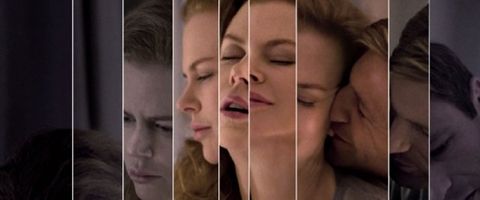When we think of a movie about closed-in people, instinct often goes to a Virginia Woolf-like figure -- a lonely person languorous in a walled room. John Cameron Mitchell’s Rabbit Hole is about closed-in people, but he chooses to begin his film in the open space of a yard, somewhat like the similar first shot of Carolyn Burnham in American Beauty. With Rabbit Hole, we meet the neighbors, we see what kind of lives our protagonists, Becca and Howie, should be leading. Then, we see them hiding in a house to avoid a neighborhood grill-out. We see them go to group therapy, scarcely speaking and never touching unless forced. We wonder what has happened. Rabbit Hole is about closed-in people who maybe weren’t so closed-in all that long ago. If Rabbit Hole is about closed-in characters, it is also about distance. Eight months after their son, Danny, was killed in a freak car accident, Becca (Nicole Kidman) and Howie (Aaron Eckhart) are still stuck in the throes of mourning. To compound matters, both are dealing with the process in nearly opposite manners. Becca wants to throw Danny’s things away, hide all evidence he existed, and move out. Howie wants the little reminders around, wants to talk about his loss with others, and maybe wants to try to have another child.
They are learning to get along with their lives despite their distance. It helps that Becca has a mother, Nat (Dianne Wiest), who has raised several very different children and has lost a boy not too long ago. Howie finds a friend in Gaby (Sandra Oh) after he continues to go to group therapy despite Becca’s dropout. But when Becca begins seeing Jason, the boy responsible for her son’s accident, it causes more turmoil to boil under the surface than could possibly ever be laid bare.
Rabbit Hole is an emotional movie, but it isn’t all emotional. There’s ski ball, Jesus jokes, drunk mothers at bowling alleys, and comic-book existentialism -- in short, a bunch of underappreciated moments that normally would be thrust aside in a film like this in favor of reaching dark depths. Becca and Howie aren’t the usual type of grieving couple you see on screen, they are just living their lives and doing the best they goddamned can. In a span of an hour and a half, they get a lot further than most movie couples facing loss.
Loss is like a tide, coming in and going out with various force and fervor. Kudos to John Cameron Mitchell for stepping out of the realm of the avant-garde to make a straight film about two people riding the tide. It’s funny how it takes so many highs and lows to land back in the middle. We may never learn if Becca and Howie make it, but just getting going is a journey in itself. Extras are scant on the disc. There are three deleted scenes, which only served to confirm my suspicion that John Cameron Mitchell had no time or budget to waste. It's a shame to see that most of the deleted scenes are shining moments for Becca’s sister, Izzy, played by Tammy Blanchard. That’s the sucky part of playing a secondary character, though.
The disc also includes a trailer -- no surprise there -- and then, commentary rounds out the special features. Rabbit Hole is based on a play by David Lindsey-Abaire, who also wrote the screenplay. The commentary is particularly intriguing if you haven’t already read the play, because Lindsay-Abaire carefully goes through the changes he made for film. John Cameron Mitchell and Frank G. DeMarco, the director of photography, also feature prominently.
If you are a special-feature lover, keep in mind the Blu-ray copies come with the same extras. Hopefully, if you’re going to buy Rabbit Hole, you’ll do so for the depth of the movie and not its incentives.

'Endlessly Grateful': Johnny Depp Opens Up About Director Taking A Chance On Him In Jeanne Du Barry

Ella Purnell And The Cast Shared Thoughts After Fallout's Season 2 Renewal (And I’m Loving Kyle MacLachlan's Enthusiasm)

I’m So Happy Elsbeth Avoided The Cancelation Axe. Two Things I Need To See Happen In Season 2
Most Popular




